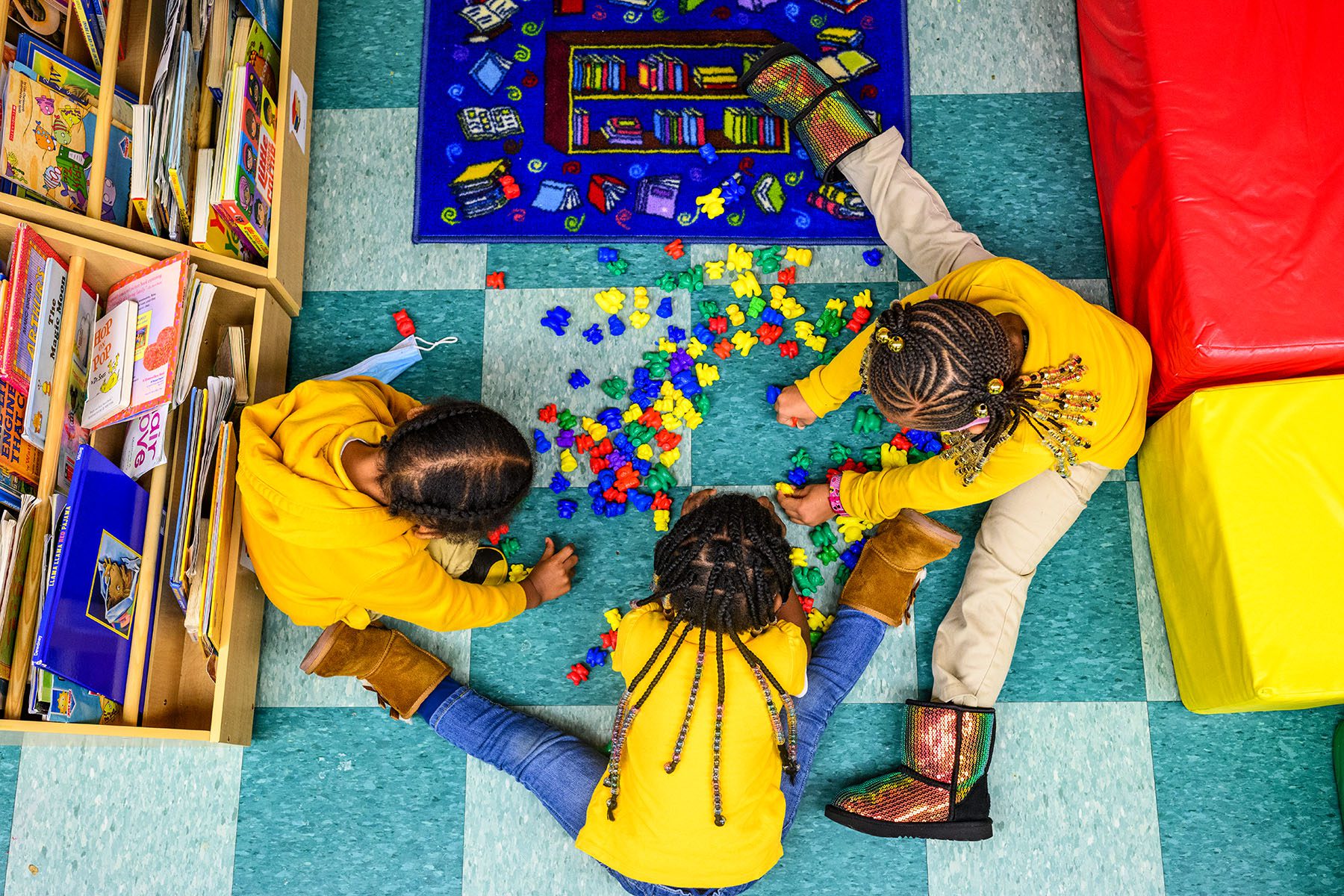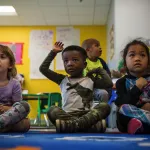In his early career as a law enforcement officer, Vernon Stanforth, the president of the National Sheriffs’ Association, said he often saw arrests of grandfathers, fathers and sons of the same family — a generational cycle of incarceration. Now, he’s also seeing grandmothers, mothers and daughters enter the cycle.
“Many of our children are being raised by grandparents, and I think today we’re even seeing some of our small children being raised by great-grandparents,” Stanforth said Thursday in a panel on early childhood education and juvenile crime. “That cycle has not been broken, and we have to break that cycle somehow.”
Law enforcement is too reactionary, Stanforth argued. A first-grade teacher once told him that she could look in her classroom and pick out which kids were going to be in jail in 20 years. She was accurate in her experience, and he was alarmed.
“If a classroom teacher can identify a vulnerable child at the age of 6 and what path they may be taking, why can’t we get in there and break that cycle at that age or even earlier?” Stanforth asked.
Stanforth was one of several law enforcement voices on Thursday’s panel, which was hosted by Fight Crime: Invest in Kids — a council of thousands of police chiefs, sheriffs, prosecutors and violence survivors dedicated to reducing juvenile crime. The event focused on the link between preschool and juvenile crime reduction and came on the heels of a new report by the organization.
Members of Congress from both sides of the political aisle — including Democratic Sen. Amy Klobuchar of Minnesota, Republican Sen. Chuck Grassley of Iowa, Democratic Sen. Bob Casey of Pennsylvania, Democratic Rep. Val Demings of Florida, Republican Rep. Fred Upton of Michigan and Democratic Rep. Tom O’Halleran of Arizona — also attended.
Carol Siemon, a Michigan prosecutor and member of Fight Crime: Invest in Kids, spoke at the panel, pointing out that an investment in early childhood education is “absolutely the best financial return a governmental unit can make for economic return — better than tax credits and a myriad of other traditional incentives to grow an economy.”
The number of American children attending early education programs has increased dramatically over the past five decades, but more than 2.5 million children from low-income families still lack access to preschool programs. And that matters because more studies are showing the benefits of preschool on not just learning but also keeping children out of the incarceration system.
The majority of states fund preschool programs, but the National Institute for Early Education says it will still take about 20 more years to provide those 2.5 million children with preschool seats — even with robust investment.
Under President Joe Biden’s social spending package, Congress would allocate $450 billion for universal pre-K. The proposal would create partnerships between federal, state and local governments to offer free preschool to all 3- and 4-year-olds. It’s unclear what the final package will contain or what the final price tag will be as congressional Democrats debate the shape of the legislation.
For years, studies have shown that pre-K supports academic and social-emotional development in the short term, which might result in greater success at school, job attainment and economic status in the long term. One study, the Perry Preschool Study, was started in the 1960s to examine the return on investment of “high-quality preschool education for young children living in poverty” and has generated data on participants from birth through age 50. The study linked preschool to reduced incarceration and found an intergenerational effect — with children of participants exhibiting fewer school suspensions, higher levels of education and employment and lower levels of participation in crime.
Jessica Hannigan, an assistant professor in the Department of Educational Leadership at California State University, Fresno, said tactics like suspension, repeatedly removing students from the learning environment, can start as early as preschool and are far more harmful than helpful. These children are not taught necessary social and emotional skills, she said. As that gap on reinforcement builds over time, these children are left behind behaviorally, and they face more frequent and harsh consequences.
“These inequitable practices have a disproportionate impact on students of color and students with learning disabilities, among other marginalized groups who are overrepresented in the criminal justice system,” Hannigan said. “Students need to be taught behaviors and given opportunity to practice them, which is captured by a popular quote: ‘A student struggling to read is not sent home and expected to return reading fluently, so why is that a student struggling to behave is sent home and expected to return behaving decently?’”
Lori Brown, a professor of sociology and criminology at Meredith College, pointed to a program implemented in Chicago and a follow-up study that found that those enrolled in high-quality pre-K were 70 percent less likely to be arrested for violent crime by the time they turned 18.
“We need to ask how likely it is that a child will misbehave, disconnect from the classroom and even skip school if they haven’t had that early education to help them do better in classes,” said Brown, whose expertise includes criminology and juvenile delinquency.
Behavior problems are often rooted in a myriad of factors. A child might be frustrated by a lack of skills, distracted by trouble at home, worried about money or feeling uncared for in class, Brown said.
“Once a kid starts to misbehave and to fail, they are seen as troublemakers or failures and the likelihood that they get suspended or held back for a grade increases,” Brown said. “And sadly, they are on a road to dropping out and even joining the criminal justice system or the classroom-to-prison pipeline.”
Ruth Paris, an associate professor at the Boston University of Social Work, said creating supportive child care environments beginning as early in life as possible is the “best way to set the stage for overall positive youth development.”
Young children are more likely to develop the skills needed to cope with adversity later in life when they are surrounded by nurturing adults, which includes caregivers and teachers. For every dollar spent on high-quality comprehensive childhood education programs for children from vulnerable backgrounds, Paris said, there is an estimated 7 percent annual return on investment for preschoolers. One study found that an influential early childhood program in North Carolina — though more than $18,500 per year — generated a benefit of 7.3 dollars for every dollar spent on it.
Erin Anderson, an assistant professor of educational leadership and policy at the University of Denver, said juvenile crime is a “complex problem” that has multiple, interrelated root causes that won’t be solved with just one intervention.
But low-cost or free preschool with highly trained and well-paid teachers shows promise, added Anderson, a former teacher and dean of school culture and discipline who is researching youth-led restorative justice in New York City.
Nearly a fifth of Biden’s $3.5 trillion sweeping social spending package is dedicated to providing low-cost care for children from birth to kindergarten—investments that would benefit single parents and low-income families.
The proposal has received bipartisan and public support. According to a May 2021 Daily Kos/Civiqs poll, more than 60 percent of Americans support free pre-K — including 90 percent of Democrats and 32 percent of Republicans.
If passed, Biden’s package would allow states to decide whether they will buy into universal preschool. The proposal could dramatically transform the early childhood education landscape with rippling effects into the criminal justice system, but its implementation could be complicated. Local governments, however, would still be able to opt in if the state refuses. Currently, the bill states that the federal government would pay for the first three years, scale back until the state is paying up to 40 percent after five years and stop funding altogether within seven years.
“The U.S. needs to provide an array of options for high-quality child care — from publicly subsidized center-based care with well-educated instructors to home-based options,” said Elizabeth Palley, a professor in Adelphi University’s School of Social Work. “In both cases, carers should receive ongoing training and a living wage.”
Palley argued that no one should pay more than 7 percent of their income for care, that parents should receive a year of paid leave with a guaranteed return to their jobs and that the government should use tax incentives to ensure leave is shared between men and women.
In 2019, the nation spent about $12,800 per child for children ages 5 to 18, according to a report from the Treasury Department. For 3- and 4-year-olds, it spent $2,800 per child. And for infants to 2-year-olds, it invested less than $500 per child. In addition, only about 1 in 5 kids who are eligible for subsidized care under the largest child care assistance program for low-income families actually received those subsidies.
Siemon said the country’s children deserve more, and that begins with education in the early years during a period of critical brain development.
“It’s not only the best economic investment, it also reduces crime, homelessness and a myriad of other social ills that continue to plague our society,” Siemon said.








